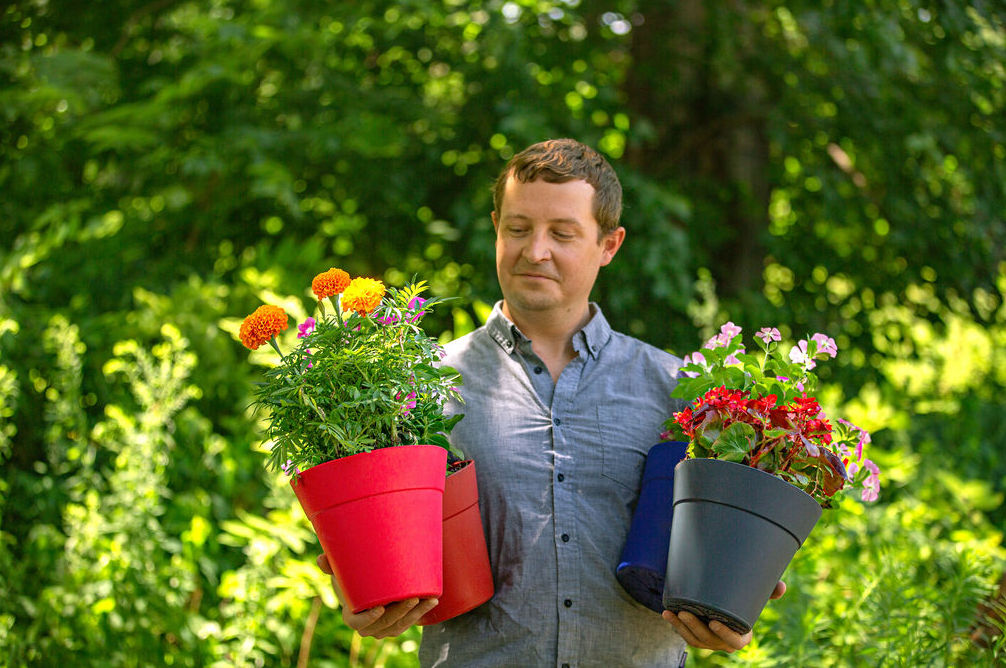‘Billions of plastic containers in the U.S. alone’: Lawrence man creates Earth-friendly solution for gardeners

photo by: Kathy Hanks
To help combat the plastic waste created by the garden industry, Ian Spomer, a Lawrence resident, has created Indapot, an indestructible silicone container that should last 100 years.
Ian Spomer was watching the BBC’s “Gardeners’ World” two years ago when the show’s host, Monty Don, wondered aloud whether there was a solution to plastic containers in the garden.
Spomer, a Lawrence resident with a degree in environmental studies from the University of Kansas, imagined that surely someone had invented a silicone flower pot.
“There is a lot of plastic waste created by the garden industry; you are talking billions of plastic containers in the U.S. alone,” said Spomer, who describes himself as a hardcore environmentalist. So, someone must have come up with an alternative.
“I have been fascinated with silicone. I have silicone hot pads and ice cube trays, bowls and cups. And I think it’s an interesting material,” Spomer said. “I thought silicone pots existed, and I wanted to buy some.”
But, as Spomer began searching online, he couldn’t find any silicone containers for growing herbs, vegetable starts, houseplants and flowers. He did, however, learn how much safer silicone was compared with plastic.
He dug deeper and decided that if there weren’t any silicone plant containers, the world certainly needed them. He researched further and learned that silicone containers don’t have any bisphenol A, an industrial chemical commonly called BPA that has been used to make certain plastics and resins. Nor does silicone contain any known hazardous chemicals. He found nothing negative. Instead, he discovered things that made the pots special.
From those ideas, his company, Indapot, was born. Indapot plant containers are made of 100% platinum-cured silicone, the highest grade available that passes all U.S. and European safety standards, Spomer said.
Spomer has come up with mold-injected containers that he thinks are just as good as a clay pot, but they don’t deteriorate from being out in the weather after several years.
They also don’t break easily. Even if you run over the plant container with a pickup truck, it pops back into shape.
“A silicone container can last in your garden for 100 years,” Spomer said. “Plus, silicone has a temperature grading between negative 80 degrees and 450 degrees, so there isn’t an environment too harsh for the pots.”
Last year, with the help of an attorney, Spomer filed a provisional patent with the United States Patent and Trademark Office. Under U.S. patent law, a provisional application, or patent-pending, is a legal document that offers an early filing date but does not mature into an issued patent unless the applicant files a regular nonprovisional patent application within the year. Spomer is in the process of getting the nonprovisional patent because he now knows a market exists for his plant containers.
“Our patent covers all plant containers made from silicone,” Spomer said. “It doesn’t matter what size.”
Spomer named the business Indapot, partially because the pots are indestructible. But it’s also short for indica, a popular strain in the cannabis family. He plans to target the cannabis industry, which also goes through loads of plastic as it grows its plants, he said.

photo by: Contributed photo
Ian Spomer holds 8-inch Indapots in their four colors. Spomer designed the Indapots to taper, aiding the drying of the soil. Also, he designed the containers to have a bit of a rise for good drainage.
Spomer designed the Indapots so that they taper, helping the soil to dry out, but not as quickly as in clay pots. Also, he designed the container to have a bit of a rise on the bottom for good drainage.
Containers come in a clay color but also in blue, red and gray. Sizes range from 4-inch, 6-inch and 8-inch pots with saucers. He also has two six-pack sizes. Plus, he has developed a square half-gallon container.
Since getting his provisional patent a year ago, he’s had several hundred of the containers manufactured in China. He has been sending them out to potential customers for reviews.
Jhami Guffey, co-owner of Jungle House, 924 Delaware St., said the development of the silicone pots was important.
“We think it’s a cool idea,” Guffey said. “We definitely see the amount of waste that goes into grower pots. We try to recycle them and bring them back to nurseries.”
Response to the containers has been positive, Spomer said. He has been to several trade shows and has upcoming meetings in Chicago to explore the wholesale end of the business.
One thing Spomer hasn’t accomplished: He hasn’t yet found a mailing address for Monty Don, the BBC gardening guru. At some point, Spomer said, Don is going to get a free pot for sparking the idea for a new Lawrence business.







